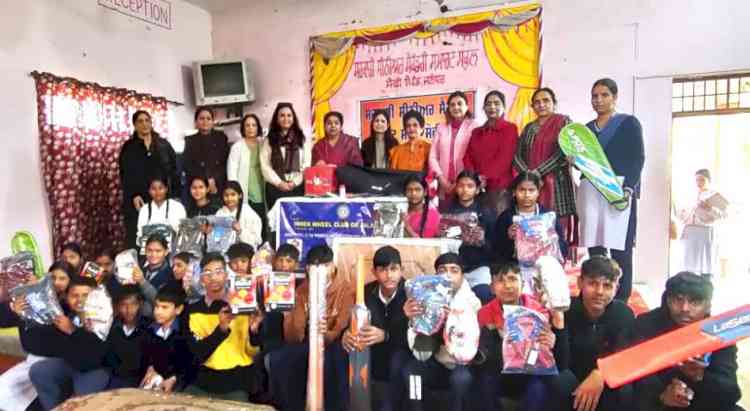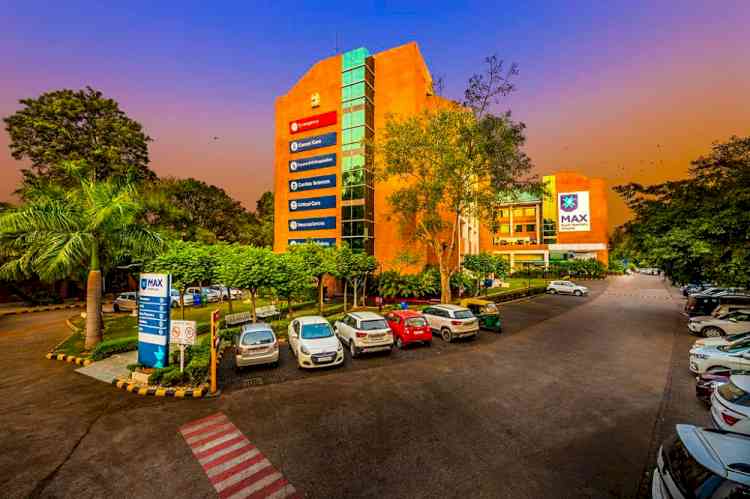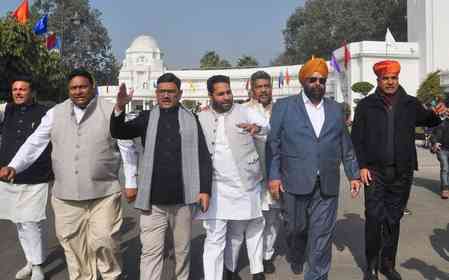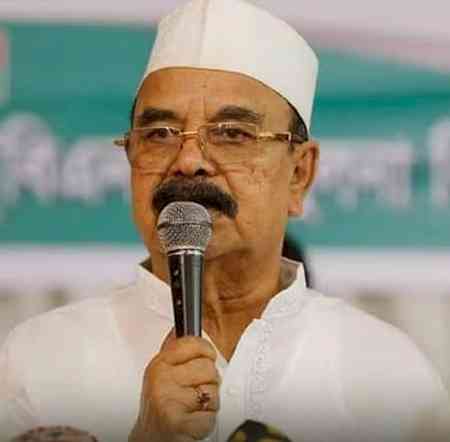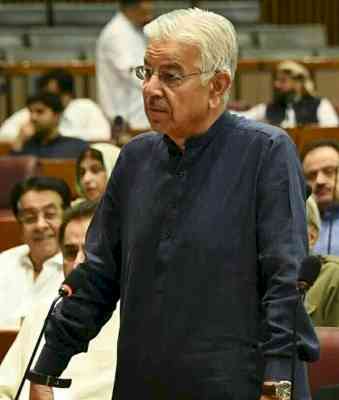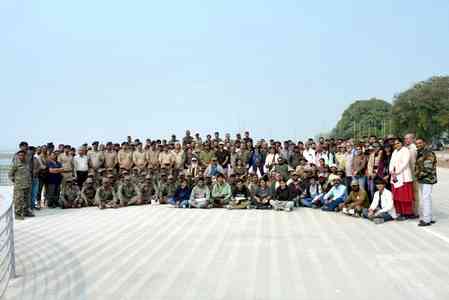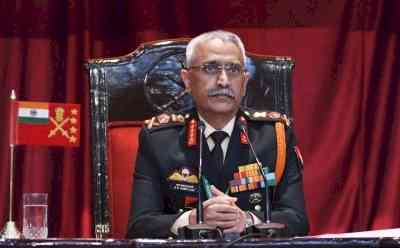CM presents strong case of state before high level team of NITI Aayog
Punjab Chief Minister Bhagwant Singh Mann on Thursday presented a strong case of the state before the team of NITI and solicited their support to ensure comprehensive development of the state on one hand and safeguard its interest on the other.
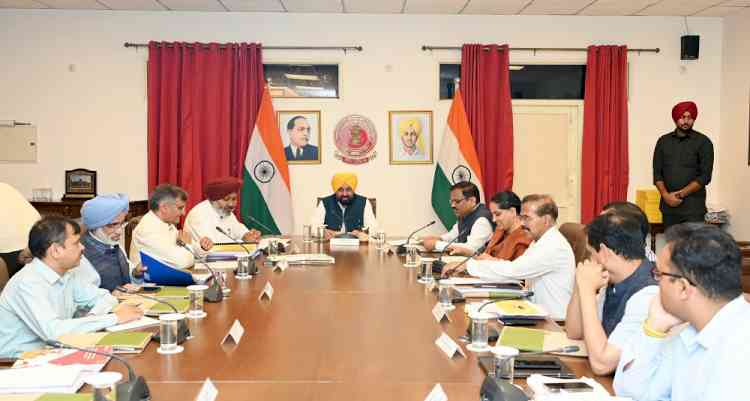
Chandigarh, June 26, 2025: Punjab Chief Minister Bhagwant Singh Mann on Thursday presented a strong case of the state before the team of NITI and solicited their support to ensure comprehensive development of the state on one hand and safeguard its interest on the other.
During deliberations with the team led by Member Niti Aayog Prof. Ramesh Chand and Program Director NITI Aayog Sanjeet Singh, the Chief Minister said that it is the high time that the Aayog should generously help the state in preserving its rich legacy in terms of water and Agriculture. He said that the state shares 553 kilometers of the International Border with Pakistan and six border districts Amritsar, Tarn-Taran, Gurdaspur, Pathankot, Ferozepur and Fazilka. However, Bhagwant Singh Mann bemoaned that Special incentives to Himachal Pradesh, Uttarakhand and J&K by the Central Government had adversely impacted the economy of border districts in Punjab.
The Chief Minister said that border districts of Punjab need to be supported on the lines of HP, Uttarakhand and J&K to revitalize the state’s trade and industrial sector. Seeking a special incentive package for border districts, he batted for establishment of Agro food processing zone in each border district of Punjab with a special focus on the Basmati rice Industry and Horticultural Produce like Litchi and others. Bhagwant Singh Mann also advocated upgradation of existing Focal Points in border districts and establishing an Exhibition-cum-Convention Centre at Amritsar.
The Chief Minister also sought PLI scheme for Agro Sector, tax benefits for Textile sector, freight Subsidy for industry and subsidized interest rate on term loans and working capital in border districts. He also underscored the need for upward revision of compensation to farmers having land between International Border and border fence asserting that more than 17,000 acres of land fall in between them. Bhagwant Singh Mann said that present compensation is given to farmers at a rate of Rs.10,000 per acre per year which should be enhanced Rs 30,000 per acre annually adding that instead of sharing between center and state, this should be totally paid by center as these brave hearts are working for making country self reliant in food production.
In order to strengthen the second line of defence in border regions, the Chief Minister also laid thrust on fortifying the Border Wing Home Guards Scheme to cover all 2107 Border Villages. He also sought enhancement of Duty Allowance from present Rs. 45 per day per jawan (fixed in 1999) to at least Rs. 655 per day per jawan adding that it is imperative for better coordination between Border Villages and BSF. Bhagwant Singh Mann also sought Rs.2829 Crore for upgradation of infrastructure and equipment, including jammers to check the smuggling of weapons and drugs through drone.
The Chief Minister said that it is important as more than 4/5th of the entire Border is without jamming systems thereby posing a major threat to unity, integrity and sovereignty of the country. Bhagwant Singh Mann also batted for revision of Vibrant Village Program launched by the Union government to benefit more border villages of the state. He said that Punjab’s Border districts are heavily populated as compared to other States, with 1500 villages within 10 Km of the Border due to which only 101 villages out of total are selected under the scheme.
The Chief Minister said that Punjab needs to be incentivized so as to cater to other felt needs of the local populace in Border Villages and Towns. He further said that recent skirmishes with Pakistan have highlighted the need for making Border Districts War Resilient due to which bunkers and Air Shelters should be constructed for city population, alternate connecting routes to Border villages, Emergency Operations Centre (EOC) should be set up along with state of the art response command and Control Centre in each District, sensors for Street Lights, trauma centers in border cities should be equipped with secondary and tertiary care. Likewise, Bhagwant Singh Mann said that communication equipment and secure lines for seamless communication with Air Force, Army and BSF establishments should be ensured, cyber security measures should be strengthened, resource mapping through GatiShakti and capacity building of District Civil Defence and disaster response workforce should be ensured.
Raising the issues of the industrial sector, the Chief Minister highlighted the key initiatives taken by the state government in terms of Fast Track Punjab Portal, Time Bound Service Delivery, Right to Business Act, Integration of Green Stamp Paper and others to attract investment. He said that the current share of Manufacturing sector in the state's economy was 14.4% but state government intends to escalate it to 20% by year 2030 and 25% by 2047. For this Bhagwant Singh Mann sought Freight Subsidy for Punjab being a landlocked State and introduction of a scheme on lines of Export Promotion Capital Goods (EPCG) scheme for small manufacturers, so that they can send their goods within the country.
The Chief Minister also sought extension of PLI to bicycles, E-bikes and their components, R&D Facilities for innovative product design and materials for bicycles and expansion of existing High - Tech Valley Industrial Park at Ludhiana in SPV mode and developing the cluster as Bicycles Export Zone. He also advocated development of Sports Goods Export Zones in Jalandhar, support for State’s Mega Sports Initiative to boost demand by developing playgrounds and indoor gyms in every village of Punjab and demanded a Special Economic Zone for promotion of sports industry. Bhagwant Singh Mann also demanded R&D Facilities for innovative product design and materials of automobiles, skill development programs tailored to cater the need of auto and EV technologies and development of dedicated Auto & Auto components Export Zones in Mohali.
The Chief Minister also demanded a special economic package for the state comprising Rs 2,000 Crore for Special Economic Zone, development of Industrial Corridors (Global Manufacturing Hub) along the Bharat Mala Project, extension of Semi Conductor Lab (SCL) in Mohali, expansion of Software Technology Parks (STPI) in Mohali and development of dedicated Sector-Specific Export Zones in Punjab- including Amritsar for Food Processing, Ludhiana for Textiles and Mohali for Automobile Parks. Talking about the agriculture sector, he recalled the stellar role of hard working and resilient farmers of the state in making country self reliant in food production. Bhagwant Singh Mann reminded that Punjab produces about 12% of country’s and two percent of world’s Rice adding that Punjab government has been making consistent efforts to promote crop diversification in the state.
The Chief Minister solicited the support of the Union government to promote crop diversification, by encouraging alternative crops to paddy which consume less water. He said that during Kharif 2025 Government of Punjab launched a pilot project in six districts to promote the Kharif Maize in the State by providing a cash incentive of Rs. 17500/- per ha. Bhagwant Singh Mann said that the Government of India should support this initiative by providing funds for payment of cash incentive @Rs. 17500/- per hectare, to all maize growers across the State under the existing CSS “Crop Diversification Programme”.
Likewise, the Chief Minister said that Cotton is an important kharif crop in south-western districts of the state and is mainly cultivated in the districts Bathinda, Mansa, Fazilka and Sri Muktsar Sahib adding that to encourage cotton cultivation and shift area from paddy new seed technology, resistant to pink bollworm (PBW), should be developed and commercialized on priority basis as pink bollworm is one of the major threat to cotton and cost on insecticides has increased to manage the insect-pest. He said that until new seed (resistant to pink bollworm) is commercialized, assistance shall be provided to cotton growers for Mating Disruption Technology (MDT) for the management of PBW. Bhagwant Singh Mann also said 20 more AI based PBW pheromone trap, which are real-time early warning system, to alert for the infestation of pink bollworm in cotton should be installed in the state as done earlier by Central Institute of Cotton Research (CICR), Nagpur, GoI.
The Chief Minister said that Labour cost is one of the prominent costs incurred to farmers in cotton cultivation as it costs about 14 percent of total value of the produce. Therefore, he said that scope of mechanization in cotton farming should be evaluated in the northern zone/Punjab adding that the Government of India should also extend support by providing cotton seed to farmers at subsidized rates. Bhagwant Singh Mann said that the major reason behind shifting of area from cotton to paddy is less profitability in cotton whereas Cotton is a water saving crop and can replace area from paddy to save the depleting groundwater.
Therefore, the Chief Minister said that farmers should be incentivized for cotton cultivation on acreage basis. Raising another important issue, he reiterated that Punjab has no surplus water for any state. Asserting that in wake of grim situation of water in the state Yamuna-Sutlej-Link (YSL) canal should be considered for construction instead of the Satluj Yamuna Link (SYL) canal, Bhagwant Singh Mann said that Ravi, Beas, and Sutlej rivers are already in deficit and water should be diverted from surplus to deficit basins.
The Chief Minister said that Punjab has repeatedly requested to be included in negotiations for the allocation of Yamuna waters as a pact for Yamuna-Sutlej-Link Project was signed between the erstwhile Punjab and Uttar Pradesh on March 12, 1954 which entitled the erstwhile Punjab to two-thirds of the Yamuna waters. He said that this agreement did not specify any particular area to be irrigated by Yamuna waters adding that before the re-organization, the Yamuna River, like the Ravi and Beas flowed through the erstwhile State of Punjab. However, Bhagwant Singh Mann bemoaned that while apportioning the river waters between Punjab and Haryana, the Yamuna waters were not considered, whereas the waters of Ravi and Beas were duly taken into account.
Citing a 1972 report by the Irrigation Commission, constituted by the Government of India, the Chief Minister said that it states that Punjab (post-1966, after its reorganization) falls within the Yamuna River Basin. Therefore, he said that if Haryana has a claim over the waters of Ravi and Beas rivers, Punjab should also have an equal claim on the Yamuna waters adding that these requests have been ignored adding that due to non-construction of storage structure on Yamuna River, water is going to waste. Thus, Bhagwant Singh Mann pleaded that Punjab's claim should be considered during the revision of this agreement, and Punjab should be given its due rights to Yamuna waters.
Raising the issue of bias approach of Bhakra Beas Management Board (BBMB), the Chief Minister said that the Board was constituted under the provisions of the Punjab Reorganization Act, 1966, with the mandate to regulate the supply of water and power from the Bhakra, Nangal and Beas projects to the partner States of Punjab, Haryana, Rajasthan, Himachal Pradesh, Delhi and Chandigarh. He said that in the past Punjab has been very liberal in sharing water with the partner States to meet their drinking water and other genuine requirements as Punjab was relying upon its groundwater reserves to meet its demand of water, particularly for the paddy crop. Bhagwant Singh Mann said that as a result, the groundwater level has depleted to a huge extent, so much so that 115 blocks out of 153 blocks of the State of Punjab (76.10%) are over-exploited adding that this percentage is the highest amongst all the States in the country.
The Chief Minister bemoaned that BBMB has been repeatedly playing a partisan role which is against the spirit and provisions of the law. He further said that of late, BBMB has been indulging in taking administrative actions which appear to be biased and against the interest of Punjab adding that the officers of Punjab in BBMB are being marginalised and ignored. Bhagwant Singh Mann said that traditionally, Member (Power) and Member (Irrigation) in BBMB were appointed from Punjab and Haryana due to their familiarity with local conditions but in 2022, a notification was issued to allow all-India appointments, stating that appointing members from specific states is in violation of the law, which is not advisable.
Speaking on the issue of desilting of Harike Head works, the Chief Minister said that it is located at the confluence point of Rivers Sutlej and Beas and is the main control point for supply of water to South west Punjab, Rajasthan and also controlling flow into Pakistan. He said that over the years the sedimentation of suspended silt/sand particles in the reservoir has drastically reduced the capacity of the reservoir and the backwater effect of the water required for optimal operation of canals is now being felt upto Kapurthala district adding that large swaths of agricultural land along the River Sutlej and Beas are becoming susceptible to flooding.Bhagawant Singh Mann said that there is an urgent need for carrying out De-silting of the reservoir at a cost Rs 600 crores approximately adding that as reservoir area has been declared a Ramsar Convention site and is of national importance, the Central Government and Rajasthan must share the cost of project.
Meanwhile, the Chief Minister said that now the water of the Indus river is to be given to the states within the country, so Punjab has basic rights over it. He said that Punjab has been catering to the food needs of the country since long so it is imperative that it should be given water for its irrigational needs. Bhagwant Singh Mann said that the interests of the state should be safeguarded by all means and no stone should be left unturned on it.



 City Air News
City Air News 
